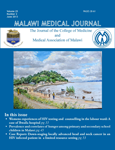
|
Malawi Medical Journal
College of Medicine, University of Malawi and Medical Association of Malawi
ISSN: 1995-7262
Vol. 27, No. 1, 2015, pp. 5-9
|
 Bioline Code: mm15002
Bioline Code: mm15002
Full paper language: English
Document type: Research Article
Document available free of charge
|
|
|
Malawi Medical Journal, Vol. 27, No. 1, 2015, pp. 5-9
| en |
Aerobic endurance in HIV-positive young adults and HIV-negative controls in Malawi
Chisati, E. M. & Vasseljen, O.
Abstract
Background
Aerobic endurance is an important aspect of physical fitness that
enables individuals living with HIV to endure in the work place as well
as in agricultural operations in order to earn a living and improve their
quality of life. However, despite high HIV prevalence rates, the aerobic
endurance status of young Malawians living with HIV remains unknown.
The objective of this study was to determine the difference in VO2max
between HIV-negative and HIV-positive individuals in Blantyre, Malawi.
Methods
Fifty five participants (17 males and 38 females) who have HIV and were
not taking antiretroviral medication and 78 HIV-negative participants (45
males and 33 females) performed the Rockport submaximal treadmill
exercise test. Measures of body weight, post-exercise heart rate and time
to walk one mile were obtained and used to predict VO2max. Comparisons
between groups were adjusted for age differences using analysis of
covariance (ANCOVA).
Results
VO2max was significantly lower in HIV-positive subjects [31.1, 28.7 -
33.5mL.kg-1.min-1(mean, 95% CI)] compared with HIV-negative subjects
[56.2, 54.3 - 58.1mL.kg-1.min-1].
Conclusion
Aerobic endurance was markedly reduced in HIV-positive participants
compared with HIV-negative participants. Findings of the current study
implicate factors associated with the HIV infection as contributors to a
decreased aerobic endurance in people living with HIV.
|
| |
© Copyright 2015 - Malawi Medical Journal
Alternative site location: http://revista.uft.edu.br/index.php/jbb/index
|
|
